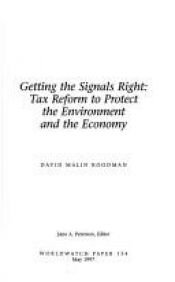Getting the Signals Right: Tax Reform to Protect the Environment and the Economy
Blurb
Progress on major environmental issues, such as global warming, will be nearly impossible until the world's governments begin to tax activities that cause the problems. Today, environmental harm often seems free even though it imposes real costs on this and future generations. Environmental taxes pass these hidden costs back to the people who cause them. And unlike most regulations, which set minimum standards, they create a steady prod for the development of environmentally sound technologies and products.Fully exploited, such taxes could also raise a trillion dollars or more a year in coming decades, allowing for an approximately 20 percent cut in conventional taxes on work and investment. Since total taxation could stay the same, governments would be protecting the environment without hurting economies even in the short term. Indeed, properly targeted, the tax cuts could reduce problems such as high unemployment and falling wages.
Turning environmental tax theory into practice, however, raises a host of policy and political issues. Supporters of change will need to think about effects on everyone from pensioners with already-high heating bills to workers and investors in the coal industry. Fortunately, environmental tax shifting creates more winners than losers, since every cut in one person's taxes is a rise in someone's else's, and everyone gains from a healthier environment. The challenge is to educate the public and build effective political coalitions among potential winners.

 English
English Español
Español Deutsch
Deutsch










Member Reviews Write your own review
Be the first person to review
Log in to comment